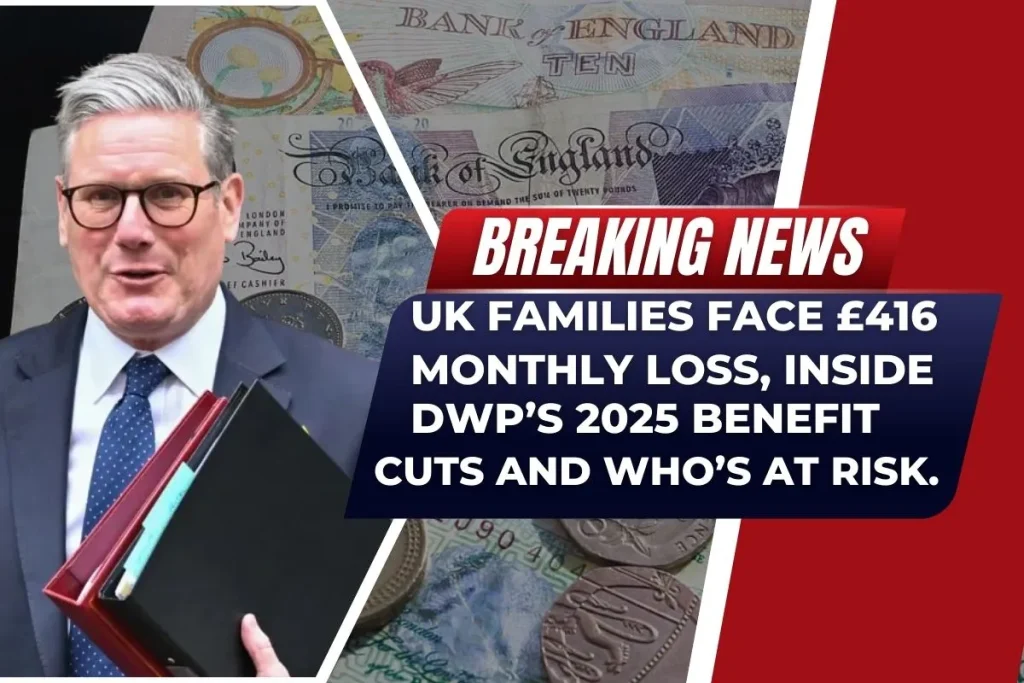Imagine finding hundreds of pounds missing from your bank account each month. For many UK families, this could become a harsh reality. New changes coming in 2025 to the Department for Work and Pensions (DWP) benefit system threaten to leave households significantly worse off. This financial hit could shake your budget to its core.
The issue is clear: proposed DWP benefit adjustments in 2025 may put real stress on your family’s finances. You need to understand these changes. This article explains the specific cuts, reveals who will feel the biggest impact, and offers steps you can take to protect yourself.
Understanding the Proposed DWP Benefit Cuts for 2025
The Financial Forecast: £416 Monthly Hit
Independent analysis points to a grim outlook. UK families relying on benefits could lose around £416 every month. This figure comes from studies by groups like the Resolution Foundation. They look at planned policy shifts and how those shifts might affect real incomes. This average loss suggests a deep cut into household spending power.
Breakdown of Potential Reductions
While exact figures remain under wraps, changes could target several key benefits. Universal Credit is often the main focus for reforms. You might see stricter rules or reduced payment rates. Other benefits, like Child Benefit or Housing Benefit, may also face adjustments. Any cut to these payments means less money in your pocket.
Impact on Household Budgets
Losing £416 a month is not a small matter. This money typically covers essential spending. Like your grocery bill, electricity cost, or rent. Such a small reduction could make it harder to afford food. It might mean struggling to heat your home. For some, paying rent or a mortgage becomes a big problem. This loss touches every part of your daily life.
Overview Table
| Aspect | Details |
| Core Issue | Proposed DWP benefit cuts in 2025 |
| Estimated Impact | Up to £416 monthly loss for affected UK families |
| Most Affected | Families with children, single-parent households, low-income families |
| Key Benefits | Universal Credit and maybe others (like Child Benefit and Housing) |
| DWP Rationale | To be detailed as per DWP statements |
| Reader Action | Understand personal impact, seek advice, budget, stay informed |

Who is Most at Risk from the 2025 DWP Cuts?
Families with Children
Families with kids who count on them are most likely to have the hardest times. Because of these changes, more kids could become poor. Many families already have a hard time taking care of their kids. Reduced benefits make this struggle even harder. You might find it tough to buy school uniforms or healthy food.
Single-Parent Households
Single-parent families often rely heavily on benefit income. This makes them especially vulnerable. With only one adult earning or managing the household, any cut hits hard. You might have fewer options to make up for lost money. This group has a greater chance of having money problems.
Families with Low Income
The most hurt will be families who already don’t have much money. If your income is low, you have little wiggle room. A reduction in benefits means less money for basic needs. You may already be choosing between heating and eating. These cuts can push you past your breaking point.
Specific Benefit Groups Affected
Some groups of claimants are more likely to see their payments drop. Staying informed is key.
Universal Credit Claimants
Changes to Universal Credit (UC) are a big concern. The DWP might introduce harsher sanctions. Rules around earning thresholds could change. Even though your UC is assessed, it might shift. Any of these adjustments can lead to lower payments for you. Understanding these rules is vital.
Disability Benefit Recipients (If Applicable)
People with long-term health problems or disabilities will be worried if future DWP plans include disability-related payments. These benefits often cover extra costs linked to your condition. Cuts here could severely impact your quality of life. You may find it harder to get the necessary support.
The DWP’s Rationale and the Political Landscape
Justifications for the Proposed Changes
The DWP often gives specific reasons for making these changes. They might talk about welfare reform. Reducing the national deficit is another common argument. The government often states that changes aim to make the welfare system fairer or more sustainable. These are the stated aims behind what you might experience.
Expert Analysis of DWP Justifications
Experts and charity groups often question the DWP’s reasoning. They might argue that cuts harm the most vulnerable. Some believe such changes increase inequality. Critics often point to the human cost rather than just the financial savings. You’ll find many different viewpoints on these decisions.
Government Policy and Future Welfare
These proposed cuts fit into the government’s larger plan for welfare. They reflect a desire to change how benefits work in the UK. This could mean a future where fewer people rely on state support. It is part of a bigger picture for social security.
Effects on the Economy and Society as a Whole
Reduced benefit payments can have wider effects. When families have less money, they spend less in shops. This hurts local businesses. It might make things take longer. Poverty growth also puts a load on public services like schools and hospitals. This could create a big effect across society.
Navigating the Changes
Understanding Your Specific Situation
It is very important to know about how these changes may affect you. First, know which benefits you claim. Then, research the proposed changes for each. This helps you grasp your personal risk. If you know what to expect, you can get ready better.
Checking Your Rights and Eligibility
Take time to review your current benefit claims. You can often do this online through the government’s official website. Look at your statements and payment schedules. Are you getting all you are entitled to now? This check helps you prepare for any changes ahead.
Seeking Support and Advice
You do not have to handle these challenges alone. Many organizations offer free support. They can guide you through complex benefit rules. Whenever you need some help, you can ask for it.
Utilizing Citizens’ Advice and Other Charities
Groups like Citizens Advice provide free, impartial advice. Step Change Debt Charity offers help with budgeting and debt. The Trussell Trust can offer food bank support. These organizations understand the benefit system. They can help you in a big way with your problem.
How to Make a Budget When You Don’t Have Much Money
If your income goes down, you need to find new ways to stick to your budget. Look for ways to cut down on expenses. Can you switch energy providers? Are there cheaper phone plans? Also, explore ways to maximize any income you have. Every little bit can help make a difference.
UK families face a significant challenge. Many people could lose £416 a month because of the planned DWP benefit cuts for 2025. Those people who are especially at risk, like families with kids, single parents, and low-income families. The first thing you need to do is understand these changes. Remember that you can get help, find out what your rights are, and plan how to spend your money. Follow any changes to the rules. Taking action right now can help make these hard times less severe.
FAQs
Q1: Which DWP benefits are likely to be cut in 2025?
The exact benefits affected are subject to government announcements. But research shows that there might be effects on Universal Credit and changes that could affect who can get Child Benefit or Housing Benefit and how much they get. It’s important to keep up with official DWP messages.
Q2. How can I find out if these cuts will have an effect on me?
You can look at your present benefit statements and rights on the government website or by calling the right DWP office. There are also a lot of independent advisory services that can help you look at your own position.
Q3. What can I do if the amount of money I get from benefits goes down?
Look over your home budget to see where you can save money. Think about ways you can make more money, like reviewing your job situation or looking for extra help. Talking to debt advice groups can also be very helpful.


